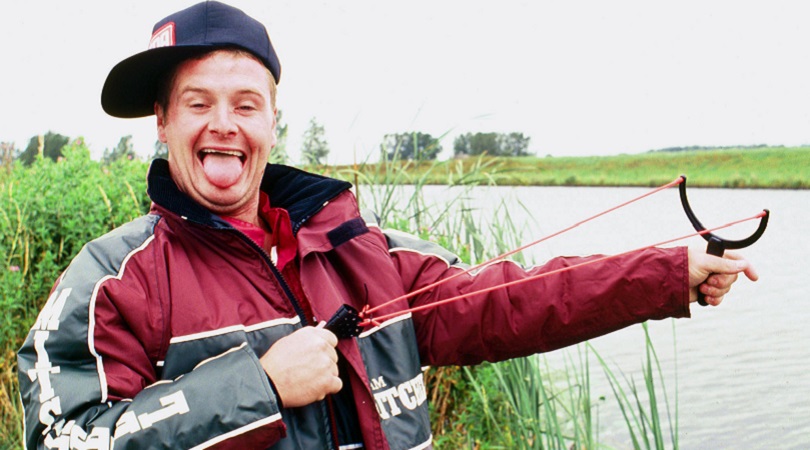
Mars Bar Kid wins the cup: Newcastle United youth, 1985
It was a season that began with a warning about cream cakes and ended with a burger on the M1
Gascoigne: “I still have great memories of that night, but I was lucky to be playing, let alone captaining the side. I’d been concentrating on Mars bars more than football for a while, but when Jack Charlton arrived at the club, he got me focused. Watford had drawn 0-0 at St James’ but we went down there without fear.
"I remember sitting in the bath and Elton John walking in to congratulate us. I was bollock naked singing, ‘Elton, Elton, give us a song’. Then Jack said he wanted me in the first team the next day. I froze when he asked. I travelled down to Norwich but didn’t play. I think the boss saw in my eyes I wasn’t ready.”
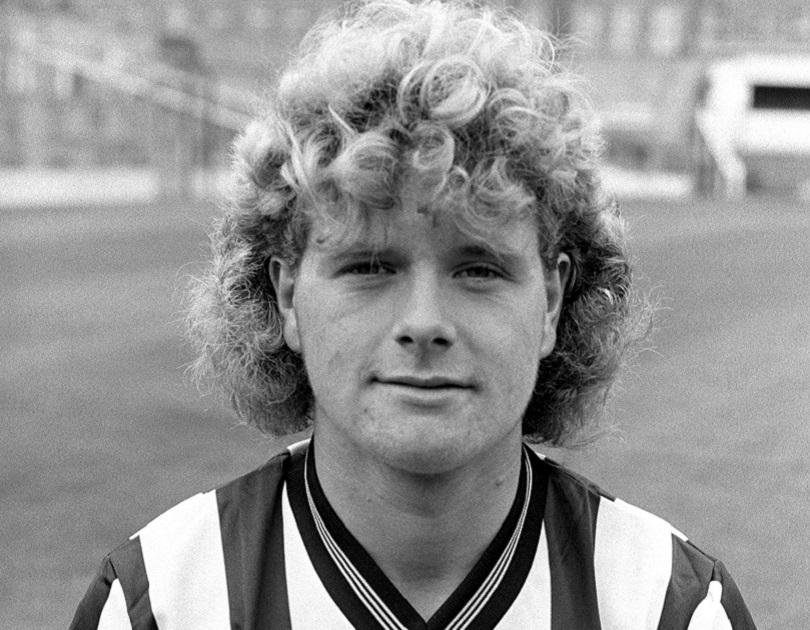
It was a season that began with a warning about cream cakes and ended with a burger on the M1. There was a first-team debut, a stunning individual performance to win the FA Youth Cup and a nude encounter with an international pop star.
The 1984/85 season might have been the one that turned Paul Gascoigne into Gazza; it was definitely the one, says boyhood team-mate Joe Allon, that turned him from “the ugly duckling into a swan”. Yet at the start of the campaign, all that seemed very far away for the 17 year old.
Making the breakthrough
His range of passing even then was unbelievable. He stood out in a team of half-decent players
“All we wanted to do was play for Newcastle United,” says Allon, the centre-forward who rose through the ranks with Gascoigne before going on to Chelsea and Hartlepool.
“I used to meet him at Central Station every morning. We’d get the Metro and the bus, the number 38, to the training ground at Benwell.
“Newcastle had been crap for years but the club was transformed when Kevin Keegan arrived in 1982. Suddenly we had players like Terry McDermott, Chris Waddle, Peter Beardsley – watching them and the whole transformation of Newcastle United was exciting. We were desperate to be a part of it.”
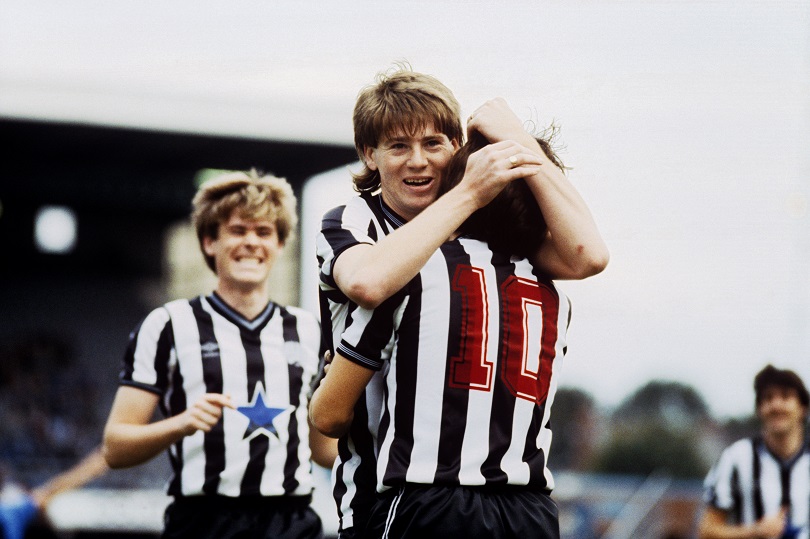
Supporter Dave Craggs recalls seeing Gascoigne at 14: “His range of passing even then was unbelievable. He stood out in a team of half-decent players.”
Manager Arthur Cox and his youth team staff agreed, while rolling their eyes at the prospect’s propensity for gaffes, such as the moped accident which ruled him out of a prestigious summer tournament, or the celebrated occasion on which he left a pair of Keegan’s boots on the bus, where they were rescued by an elderly fan called Auld Stevie.
Then there was his fluctuating weight, fuelled by custard tarts and cakes from the nearby Oven Door Tea Room. “People used to call him ‘the chubby little chap’,” says Allon.
Tough love
Gascoigne was told he was too fat – Charlton actually patted the youngster’s stomach disdainfully
The departure of Cox in a contractual dispute shortly after Keegan’s retirement in May 1984 stalled what seemed to be a comfortable passage to the first team. Invited to meet replacement Jack Charlton, Gascoigne was told he was too fat – Charlton actually patted the youngster’s stomach disdainfully – and would be dropped from the youth team as a result.
“I’m giving you two weeks,” said the 1966 World Cup winner. “If you’ve not made it by then, I’ll show you the door.”
Gascoigne spent 10 days running in a black plastic bin liner after training, winning a recall and later the youth team captaincy.
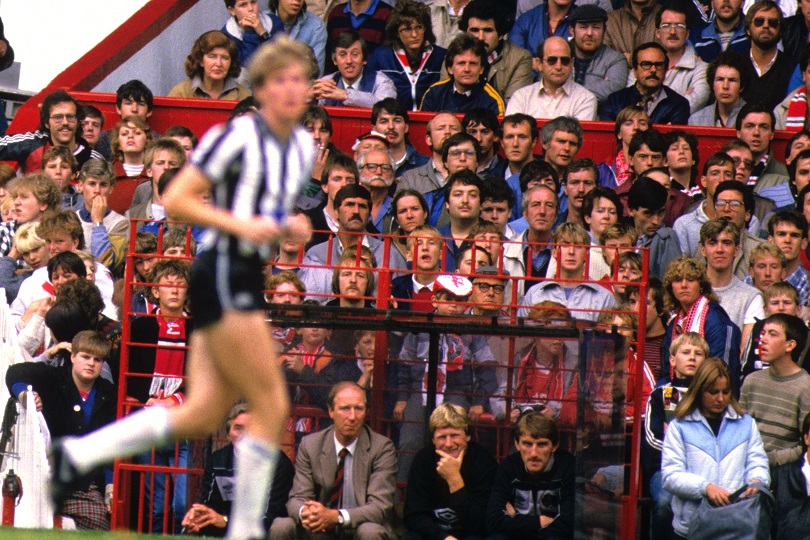
“He and I had got the recognition previously because we scored most of the goals, but we were just two good players in a very good side,” says Allon. “Then Paul started to blossom and he was magnificent in our cup run. There was a bit of Hans Christian Andersen about it all – the ugly duckling turning into a swan.
"He was on the road to where he got to in Italia 90, the best player in the world, but he never changed. He could be quiet and shy, though most times he was silly and loveable. And he was unbelievably generous: he’d give money away to people he thought needed it, leaving himself broke.”
With a supporting cast including keeper Gary Kelly, defender Kevin Scott and winger Paul Stephenson - who all went on to make more than 50 appearances in Newcastle’s first team - plus midfielders Ian Bogie and Brian Tinnion and defender Jeff Wrightson, who enjoyed success elsewhere, the Magpies brushed aside Everton, Manchester City, Leeds and Coventry by a combined 13-1 scoreline en route to the semi-final.
There, a Birmingham City side led by Julian Dicks were hammered 7-2 on aggregate. Gascoigne had scored seven times ahead of the final, and made his senior debut as a substitute against QPR on April 13.
The first leg of the final brought 1982 winners Watford to St James’ Park on April 30, where more than 7,000 home fans turned up to watch what they hoped would be Newcastle’s first youth trophy since 1962.
Though the consensus is that Hornets goalkeeper Derrick Williams played a worldie, Allon remembers: “We were s**t in the first one. It was really disappointing because there’d been a great crowd. In the first round we’d had three men and a dog watching.”
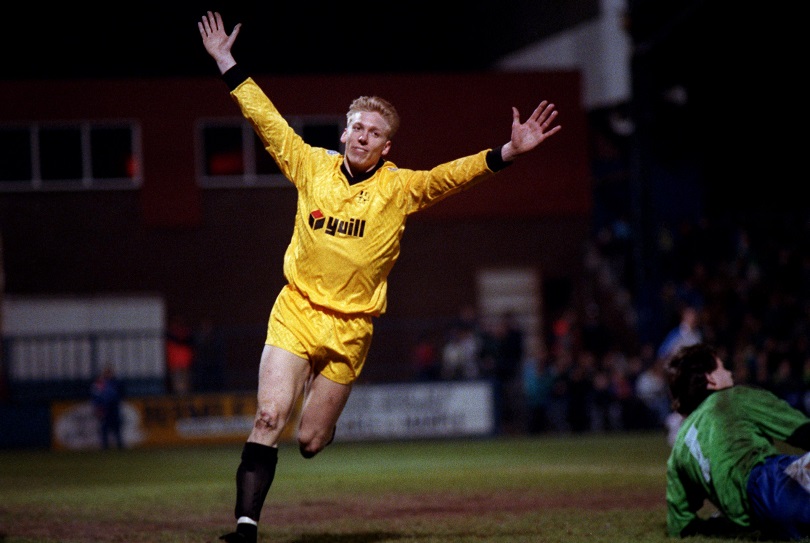
Natural talent
One 30-yard pass fatefully caught the eye of Tottenham chairman Irving Scholar
On May 6, Gascoigne made another substitute appearance for the first team against Spurs, with one 30-yard pass fatefully catching the eye of Tottenham chairman Irving Scholar.
Four days later the youth team travelled to Vicarage Road, accompanied by Charlton and his assistant Maurice Setters, as well as coaches Colin Suggett and Jimmy Nelson. “We played cards all the way down and Big Jack promised us a steak dinner if we won,” recalls Allon.
This time, in front of 7,097, there would be no heroics from Derrick Williams. “The second time we smashed them,” says Allon. “I always felt, and still feel, that we were a really good team, but Paul was the conductor that night. He was instrumental in everything we did.”
Gazza was irresistible from the off. “At Watford in those days, you sat on benches on the side of the pitch,” Nelson said, “and the guy who was at Watford at the time, Tom Walley, had produced some very good players. Right in front of the pair of us on those benches, which were about a yard apart, Paul megged this lad. The lad turned around and Paul megged him again on the way back. I shouted: ‘Behave yourself!’
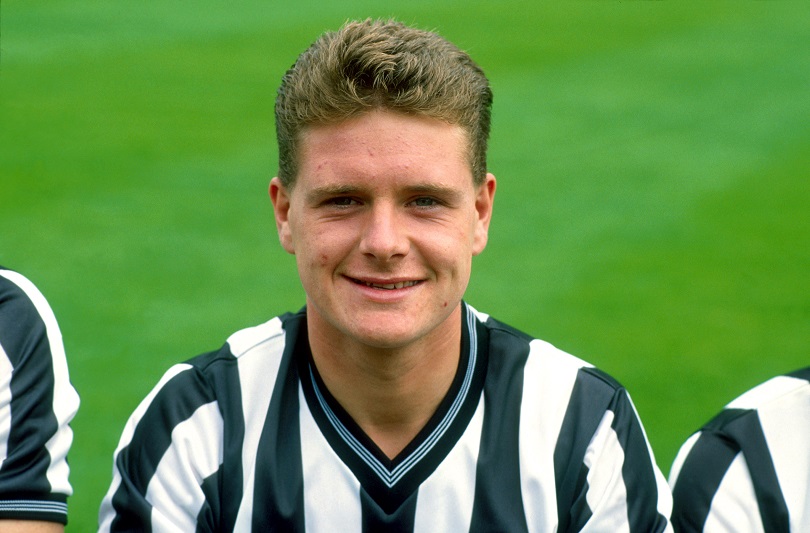
"He smiled, winked and raked a 50-yard pass to Joe Allon, who I think went on to score. Walley simply said: ‘He’s got a chance'.”
While Allon would score another and Malcolm Allen would net for the hosts, there was no doubting the real star of the show.
“Gascoigne looked streets ahead of the people he was playing with and he was a nightmare to play against,” says Dave Craggs. “The physique he had would ease players off the ball, and the speed of thought he had would put him in yards of space. He would take defenders on and laugh at them. He worked on a different level, with this sense of fun, and he did it all night long.”
Contract offer
On the way home we did get our steak supper from Jack Charlton. But it turned out to be a Burger King at the services
A performance of outstanding quality was capped by a strike of sheer brilliance, one of two Gazza goals in a 4-1 win. “He took on three players, nutmegged two of them, moved it sideways and smashed it in,” says Craggs – “one of the best goals I’ve seen at any level.”
Allon adds: “It was from 25 yards and right in the top corner, by the way. A striker like me didn’t even know about putting the ball into corners. It was typical of Paul’s unique talent. That day he was majestic – different gravy. For me it was looking at someone and thinking: ‘Wow, you are there, man’.”
An astounded Setters told the press: “You’d have to wait a thousand years to see that again.”
“On the way home we did get our steak supper from Jack Charlton,” says Allon. “But it turned out to be a Burger King at the services.”
Before they even got off the bus, Charlton offered Gascoigne a full two-year contract, with his wages rising from £25 to £120 a week and another £120 per first-team appearance.
In addition, the manager promised to take him out fishing, the hobby that Big Jack had recently parlayed into a successful TV series, book and computer game. Emboldened, Gazza went out and spent his first £120 on top-of-the-range fishing gear.
On the riverbank, Charlton took one look and threw the lot in the river. Then, Gascoigne later recalled, “He took out a can of Guinness, poured it into the water and all the fish came.” The young man clearly had plenty still to learn.
Italia 90, here I come: England 4-2 Czechoslovakia, 1990
When Robson turned to the back of the Daily Mirror, he saw a large photo of Gascoigne dressed in a clown suit
Gacoigne: “Going into the match against Czechoslovakia, I was terrified I wouldn’t make the World Cup squad.
"We’d gone to Israel and Bobby Robson had said ‘this is your chance’, but I had a crap game. Plenty in the press were saying I wasn’t ready – I knew this was my last chance to prove them wrong. I just thought: ‘What have I got to lose?’. It was magic.
"Everything I did came off. I walked off the pitch pretty sure I’d be in the squad. To play a faultless game, to score, to set up two goals for Steve Bull and to get the press boys screaming for me to play made it a great night.”
On the morning of April 25, 1990, with the World Cup only 45 days away, the nation’s back pages once again reported Bobby Robson’s agonising over whether Paul Gascoigne was sensible enough to make his Italia 90 squad.
If the man England players knew as ‘Gasser’ was worried, he had a funny way of showing it. When Robson turned to the back of the Daily Mirror, he saw a large photo of Gascoigne dressed in a clown suit. The boy was irrepressible.
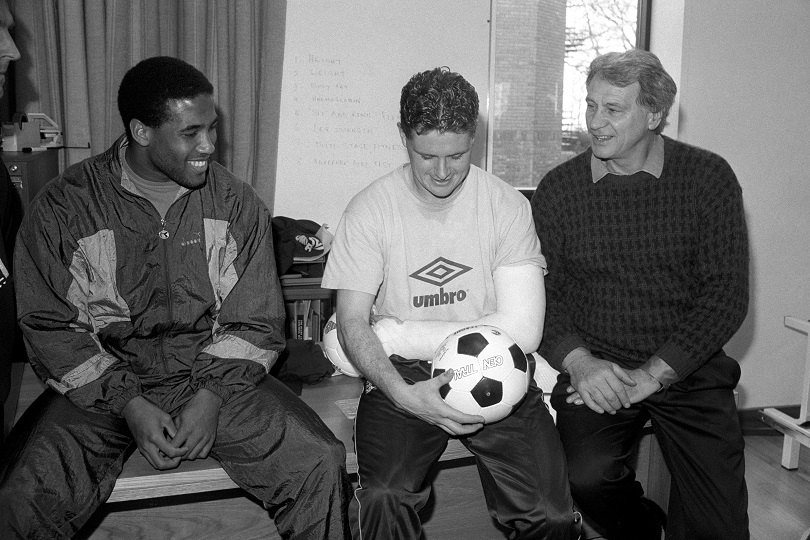
Fitting him in
Wembley loved his 23 minutes against Albania in April 1989 but Robson berated him for his lack of positional discipline
Earlier in the week, in response to publicly being called “daft as a brush” by the England manager, the midfielder had turned up for training ahead of a friendly against Czechoslovakia with a hairbrush sticking out of his sock.
After a bravura performance against the Czechs, the joke was on those who considered Gazza too much of a risk. “The England manager may still consider Paul Gascoigne to be ‘as daft as a brush’, but last night the brush was in the hand of a man who did not need artistic licence to make his point,” wrote David Lacey of The Guardian.
Gascoigne’s desperation to play for England had been influential in his July 1988 move to Tottenham, with thoughts of moving to Manchester United quickly dispersing once adviser Mel Stein had told Gazza he would be foolish to snub Terry Venables, so clearly a future Three Lions manager.
“[England] was a passion for him and Venables said: ‘Come here and you get to play for England’. Ten weeks after joining Spurs, he had an England call-up,” says Nick Taussig, producer of documentary Gascoigne.
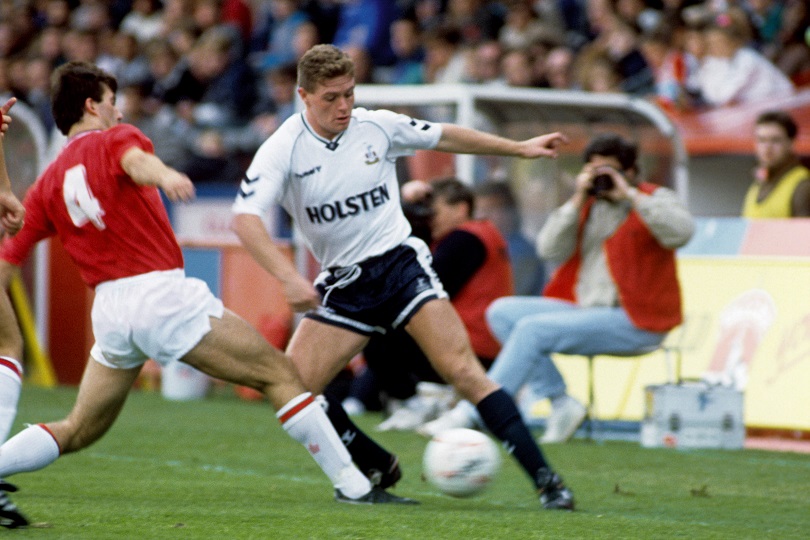
That debut came against Denmark in September 1988, but the next 19 months were purgatory for Gascoigne. Wembley loved his 23 minutes against Albania in April 1989 but Robson berated him for his lack of positional discipline.
Starts for the national side were interspersed with B-team games, and Robson wondered publicly how Gascoigne could fit into a midfield where the competition included Bryan Robson, Trevor Steven, Steve McMahon, David Rocastle, Neil Webb, Steve Hodge and another emerging talent, David Platt.
Players and journalists alike could not decide whether the manager really harboured doubts about his fellow Geordie or if, like Charlton before him, he was testing Gascoigne.
“I thought it was a bit of mind games because he was such a Bobby-type player,” says Peter Shilton. “He’d brought in Arnold Muhren and Frans Thijssen at Ipswich and he loved players who could pass the ball and dribble. I thought there was an element of kidology to it. It would have been very difficult for him to have left a player like Paul Gascoigne at home.”
Helping the atmosphere
While the press pack contained pro- and anti-Gascoigne factions, senior England players loved him
Journalist Rob Shepherd believes “there was a bit of psychology to make him focus; to let him know he couldn’t be a circus act. At the same time, Bobby did have a concern that despite all his talent he could not be trusted.”
While the press pack contained pro- and anti-Gascoigne factions, senior England players loved him.
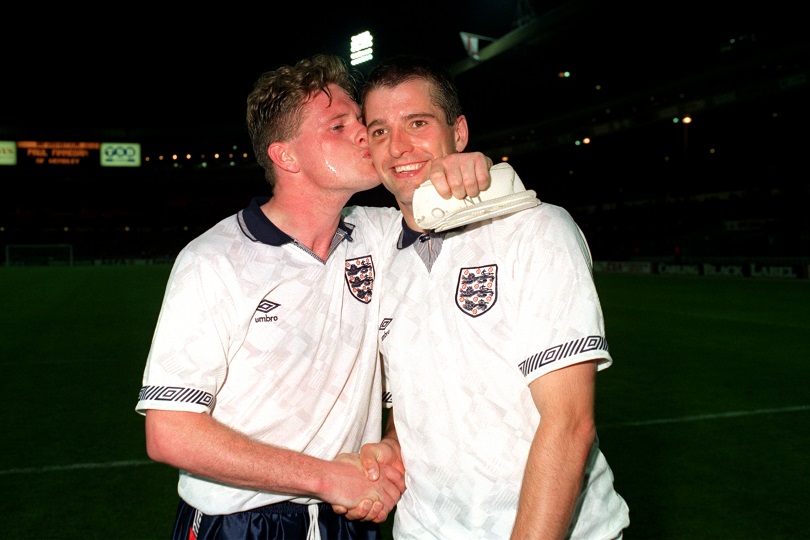
“Bryan Robson and Chris Waddle, who were very influential, wanted him in the squad,” says Shepherd. “Everybody liked him, partly because he’d do these things. Once, at an airport, we were waiting for the baggage carousel and he emerged from the hole the bags come through, riding a suitcase.”
Shilton adds: “He’d made an instant impression on me from when he first played against Derby. In the England camp he scored some brilliant goals against me and did some funny things to keep the atmosphere going. He would score from distance, pass well and get up and down the pitch. We had some good players but not many could do that.
“Bobby was great at handling Gazza. We had Waddle and [Terry] Butcher and Bryan Robson – enough players to keep their eye on him. At times he would be a bit childish; most times it was funny.”
Still Robson agonised, and as late as February he said at a Football Writers’ Association lunch that 22-year-old Gascoigne and 23-year-old Platt were fighting over one place at the finals. By the time the friendly against the Czechs rolled around, Gascoigne was on the edge in more ways than one.
Pete Davies wrote in All Played Out, an account of England's Italia 90 campaign: “He was so coiled up beforehand that in the tunnel he nearly decapitated me, bouncing a ball off the wall inches from my head with this really manic aggression. He knew this was his ticket to Italy.”
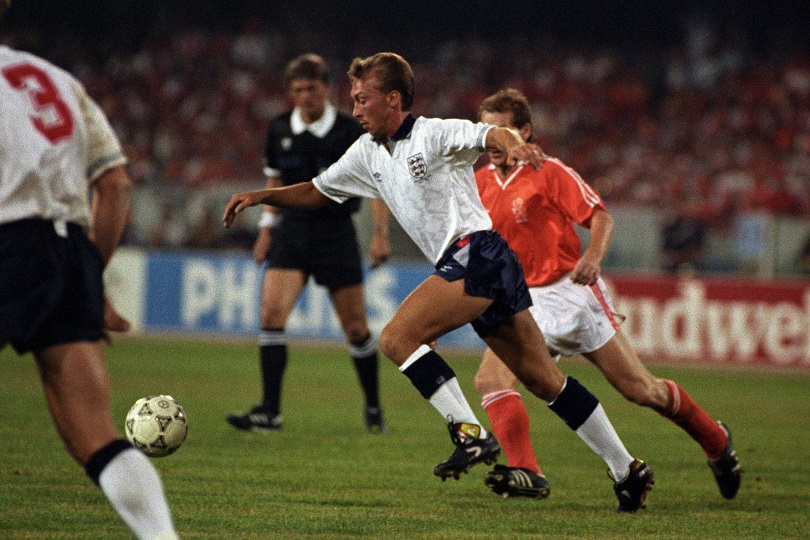
Bobby Robson's influence
Only when Gascoigne got back to his hotel room did the true consequences of his performance and his late goal begin to sink in
After a worrying opening sequence in which he might have been booked for a clumsy challenge and then patted the ref on the cheek, Gascoigne took control of himself and the match.
He sent a glorious 25-yard pass in for Steve Bull to open the scoring; put a corner on the head of Butcher, who knocked down for Stuart Pearce to score; set up a second for Bull; and then strode onto a ball from Tony Dorigo and finished with aplomb.
"It was arguably one of his best performances for England,” says Shepherd. “He took the goal well, showed a great range of passing, and kept a lid on it.
“It was a credit to Bobby, telling him there’s more to playing for England than just ability,” says Shilton. “Paul responded in the best way.”
In the dressing room after the game, Robson and Gascoigne jokingly squabbled, the manager claiming he couldn’t count the corner as an assist if it had been flicked on. Robson told reporters: “He passed the test, but you’re not a player after one match.”
Only when Gascoigne got back to his hotel room did the true consequences of his performance and his late goal begin to sink in.
“I watched the highlights,” he wrote later, “and as the ball hit the net Bobby Robson turned to Don Howe and said, ‘That’s fantastic’. When I saw what he said I knew I’d made it.”
Gazza drags broke Spurs to Wembley: Tottenham, 1991 FA Cup
I was still buzzing after the World Cup – there wasn’t anything I couldn’t do
Gascoigne: “Despite what happened to me in the final, the whole cup run holds great memories for me. I was still buzzing after the World Cup – there wasn’t anything I couldn’t do. I scored loads of goals to get to us to Wembley and played the best football of my career along the way.
"Looking back, perhaps people expected too much from me, and that was tough, but I was fearless and didn’t give a s**t who I faced. The games against Oxford, Portsmouth and, of course, Arsenal were among my best. I didn’t sleep the night before the final and I was too hyped up, maybe. The rest is history.”
Irving Scholar coveted Gascoigne from the moment he saw him make his second Newcastle appearance a few days before the 1985 FA Youth Cup Final second leg. Yet the Tottenham chairman’s instincts hadn’t always been so sound.
Having floated his club on the Stock Exchange with mixed results in 1983, by the end of 1990 Scholar had diversified into clothing and computing while buying marquee players and redeveloping White Hart Lane.
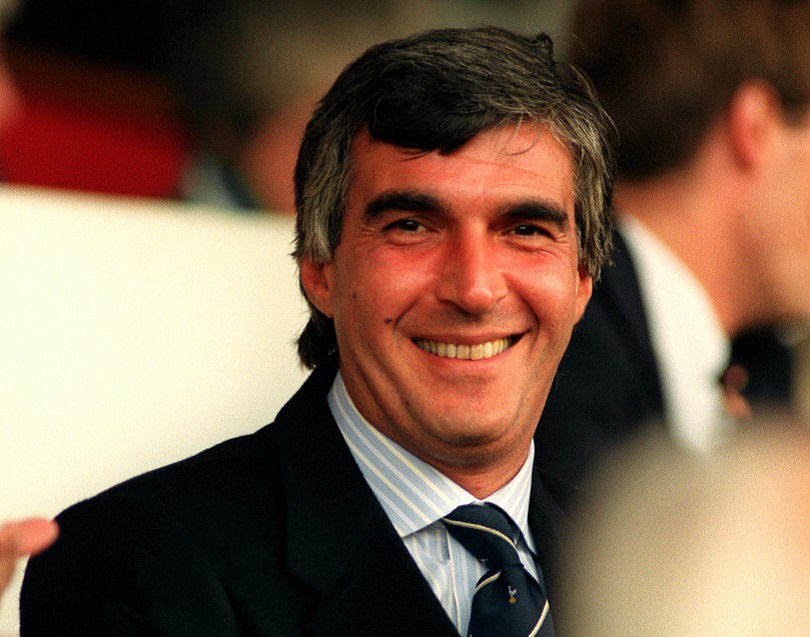
Up for sale
The financial stuff meant there was an aura of decline and it was pretty clear Gascoigne was going
The result was a £10 million overdraft and Robert Maxwell circling like a vulture. Spurs’ bankers appointed respected City figure Nat Solomon to sort out the mess, and privately he recommended selling Gascoigne to ease the debt.
By the time Tottenham returned from Blackpool after a 1-0 win in the third round of the FA Cup, the news had leaked to the extent that as the team coach passed a nightclub called Rumours, midfielder Paul Stewart looked out of the window and mused: “There’s plenty of those about at the moment.”
As broadcaster and Spurs fan Danny Kelly comments: “We had a pretty good team – Gary Lineker, Paul Stewart, Gary Mabbutt, Paul Allen – but the financial stuff meant there was an aura of decline and it was pretty clear Gascoigne was going. The FA Cup run felt like his gift before he went off to Italy.”
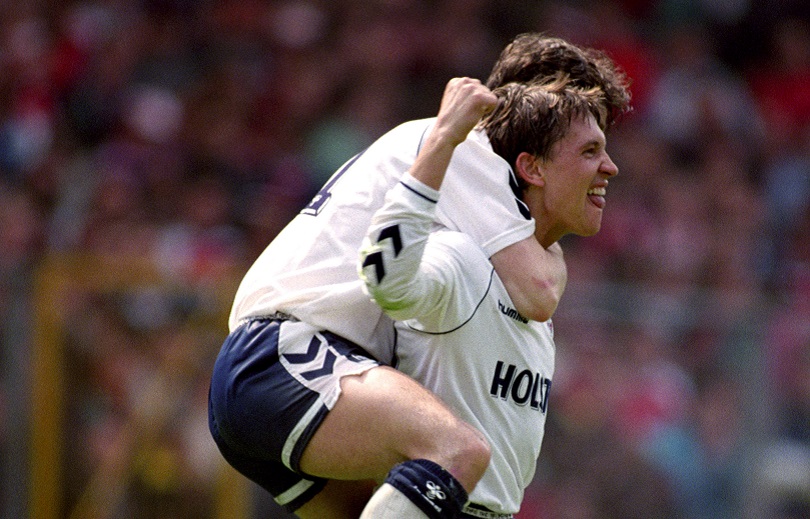
With Terry Venables on hand to counsel and occasionally indulge him (“I can never see them together without thinking of Arthur Daley and Terry McCann, a senior chancer and a junior chancer,” says Kelly), Gazza was in the form of his life.
“Paul was able to take games by the scruff of the neck,” says Mabbutt. “It was known, though not discussed, that he would be leaving at the end of the season, but it had no effect on him.”
Gascoigne scored six goals on the road to Wembley, the most memorable being the first of two at Fratton Park in the fifth round, where Kelly was in the away end. “The first was a header – but what a header,” he says.
“I remember him running into the box and hurling himself at the ball. He seemed five feet off the ground, making this massive lunge at it.
"For the winner, he ran on to the end of a long ball, eased across the defender and scored. He was a powerful, physical force at that time and he could run all day like a child.”
Dragging Spurs through
Gascoigne scored the winner against Notts County in the quarter-final to take Tottenham into a semi against Arsenal
Gascoigne’s performance was all the more remarkable considering he had spent the previous night manically playing 11 straight games of squash against reserve player John Moncur.
“It’s not possible in football to win games single-handedly but in that run he was as close to it as you will ever come,” says Mabbutt. “That was true of the fifth round against Portsmouth, when he really saved us after Mark Chamberlain scored, but also in the previous round at home to Oxford United, where he was just outstanding.”
Gascoigne scored the winner against Notts County in the quarter-final to take Tottenham into a semi against newly crowned champions and deadly rivals Arsenal. Kelly feels: “The country wanted us to win, because Arsenal were so negative and we had this imp, laughing and sticking his tongue out and playing football with a wink.”
On April 14, 1991, the irresistible force beat the immovable objects 3-1. “We totally outplayed the champions and Paul was the instigator,” says Mabbutt. “Who else tries a free-kick from that far out at Wembley?
“I’m still disappointed I don’t get an assist for that goal because if you watch it on YouTube, you’ll see me making a run behind the wall to divert Alan Smith. I timed my run with Paul’s, and you can see me duck at the very moment he puts the ball straight at my head. I keep telling Paul that if I hadn’t ducked that day we’d never have heard about his free-kick again.”
Peak of his powers
Paul did eventually come back to a very high level but he was never able to surpass the form he showed in that FA Cup run
Five weeks later, Tottenham were back at the Twin Towers. Similar to the friendly against Czechoslovakia a year earlier, a pumped-up Gascoigne – who had required sedatives to sleep the night before – could be seen pre-match hammering balls at the tunnel wall with frightening intensity. Not even a private talking-to from Venables 10 minutes before kick-off could calm him down. He lasted 17 minutes.
“In the documentary there’s a moment we filmed when he is describing the doctors telling him, ‘You’re going to be out for a bit’,” says Nick Taussig. “He’s saying: ‘Three months? Six months?’ If it had been either of those he might have been OK, but of course it was much, much longer.”
Mabbutt says: “Paul did eventually come back to a very high level but he was never able to surpass the form he showed in that FA Cup run. He was astounding in every single game. It was the very best of Paul.”
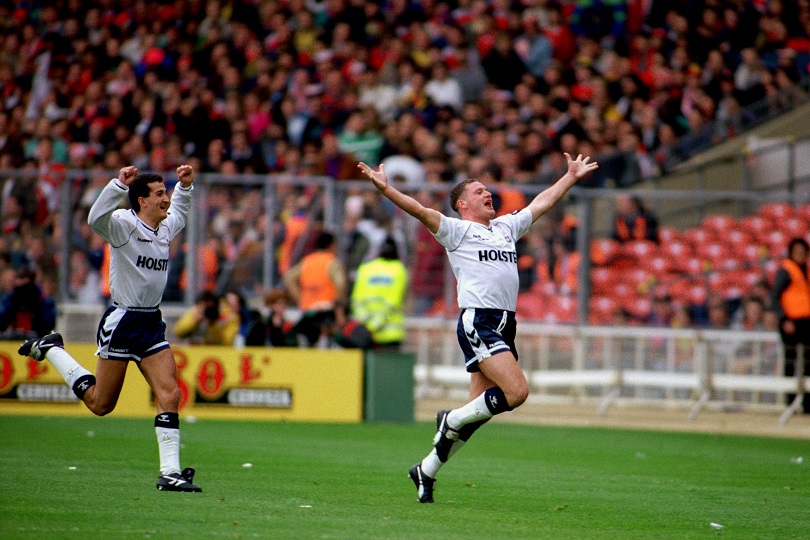
Fishing rods and bare-faced cheek: Lazio, 1992-95
Fit and proper person Gascoigne clearly had trouble getting used to the way Italian clubs strictly monitor players
Gascoigne: “My time at Lazio was strange. I had so many injury problems that I only managed to play 30-odd games. The training was like nothing I’d ever experienced: they ran you into the ground before you even looked at a football. That was a huge culture shock for me.
"People say I didn’t do well over there, but the fans loved me. I still have great memories: scoring in a Rome derby, facing the likes of Marco van Basten and Diego Maradona... that was special, and I have no regrets about going out there.”
Fit and proper person Gascoigne clearly had trouble getting used to the way Italian clubs strictly monitor players (including, crucially, their diet), as Manzini recalled: “Zoff told me to keep an eye on him during his holidays. Paul went to Miami one summer and I used to have to ring him up every day. He kept telling me everything was fine.
"The day he flew back, I turned up at the airport to meet him. I caught sight of this huge-looking guy and said to a copper standing next to me: ‘Ha, he looks a bit like Gazza, doesn’t he?’ Then I realised it was him. He must have weighed 89 kilos.”
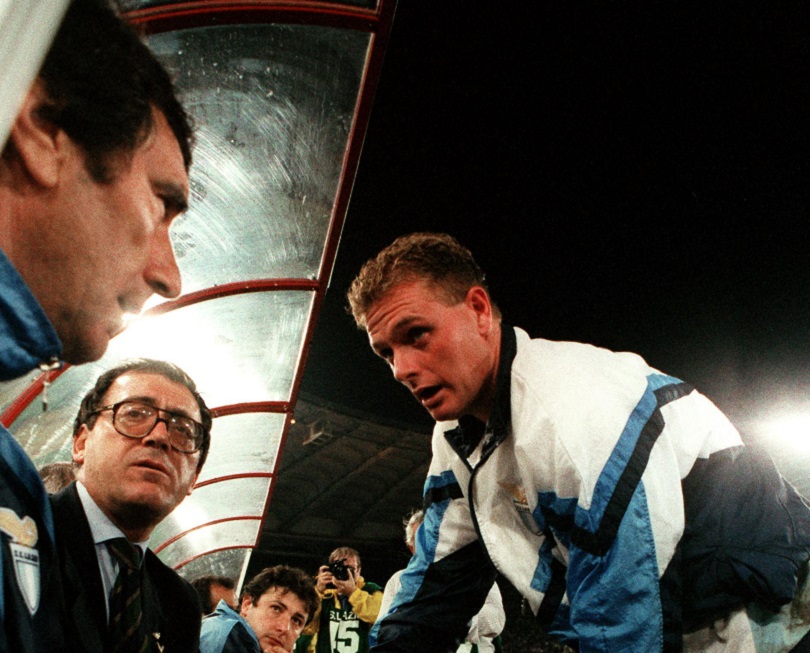
Fishing rod forgiveness
Gazza made a point of telling Nesta it wasn’t his fault and even presented him with a fishing rod (“I have no idea why,” Nesta admitted)
Lazio teammates rarely have a bad word to say about Gascoigne. Former striker Beppe Signori once said: “No one could ever dislike Paul, he was so generous. If you ever said: ‘Gazza, what a beautiful watch, where did you buy it?’, he would take it off and give it to you.”
Younger players would always be treated to presents, too. Future Italy international Marco Di Vaio remembers being given an expensive camera, while a young Alessandro Nesta was treated with good grace, despite indirectly causing the England midfielder to suffer a double fracture of his right leg in training.
Gazza made a point of telling Nesta it wasn’t his fault and even presented him with a fishing rod (“I have no idea why,” Nesta admitted).
It wasn’t just banter. It’s telling that Gascoigne played a full 90 minutes in just 17 of his 47 games for Lazio.
A celebrated derby display and stunning Coppa Italia goal against Pescara stand out, but the impression lingers, in the UK at least, that Gazza failed in Serie A.
Not so, insists Lazio fan Luca Pasqualini: “It was obvious from the start that he was different from the others: he was a man, a friend, a joker, but above all a player who respected the Lazio shirt, something a lot of people forget today.
"He always had a lot in common with the supporters: the respect, the will, the passion and the fantasy. There was a time when Gazza, Lazio and the fans were the same thing.”
A misunderstood artist
Ex-team manager Maurizio Manzini even claims that he once had to act as interpreter during an interview with a Sun journalist
Former Lazio boss Dino Zoff is seen by some as remote and unsympathetic, but Gazza frequently had the former World Cup-winning captain collapsing in fits of giggles.
Speaking on an Italian chat show in 2013, Zoff said: “Gascoigne used to drive me mad, but I had such a great affection for him because he was an artist. He was a good boy – one who never suppressed his instincts. A lot of the time he was a disaster, but that’s what artists are like.”
Maybe Gascoigne needed a trusted patron, to understand his moods. Could that have been Zoff? Sadly we didn’t get the chance to see; Zoff moved upstairs and made way for the less understanding Zdenek Zeman.
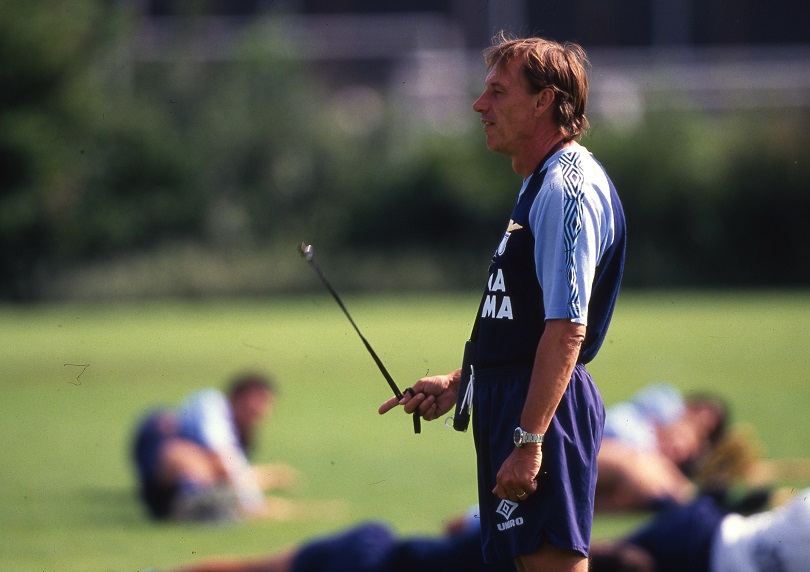
The poet Lord Byron once wrote that the Italian language “melts like kisses”. Thankfully he never heard Gazza’s attempts at la bella lingua.
“His Italian was awful – he used to give everyone and everything English nicknames,” ex-Lazio and Chelsea forward Pierluigi Casiraghi revealed.
Legend has it that an exasperated Gascoigne, trying to order lunch in a Rome restaurant, once reached into a fish tank and grabbed hold of a lobster, yelling: “Here, this one! I want this one!”
He had better luck teaching fellow squad members Geordie slang. Ex-team manager Maurizio Manzini even claims that he once had to act as interpreter during an interview with a Sun journalist, helpfully translating Gazza’s mumbled Geordieisms into English for the bemused tabloid scribe.
Gazza’s flying tackle
Angry that Gazza had snuck out of the team hotel, Zoff instructed Manzini to fetch the player immediately
Italians love a bit of Benny Hill, so Gazza’s fondness for public nudity would always strike a comedic chord among the chortling Lazio staff.
Casiraghi remembered: “He was a man with the heart and the eyes of a child. We were on the team bus once and he sat down behind Zoff. As soon as the bus went into a tunnel, he stripped off and just sat there, waiting for Zoff to turn around.”
Another time, angry that Gazza had snuck out of the team hotel, Zoff instructed Manzini to fetch the player immediately. “We’d all just finished eating, the team’s gathered together and there are other hotel guests in the dining room,” Zoff explained.
“Suddenly, the door opens and Gazza, totally naked, walks through the room like it’s the most natural thing in the world. He comes up to me and says: ‘Here I am, boss. Manzini told me to come straight away, just as I was’. I couldn’t think of anything to say to him, so I simply burst out laughing.”
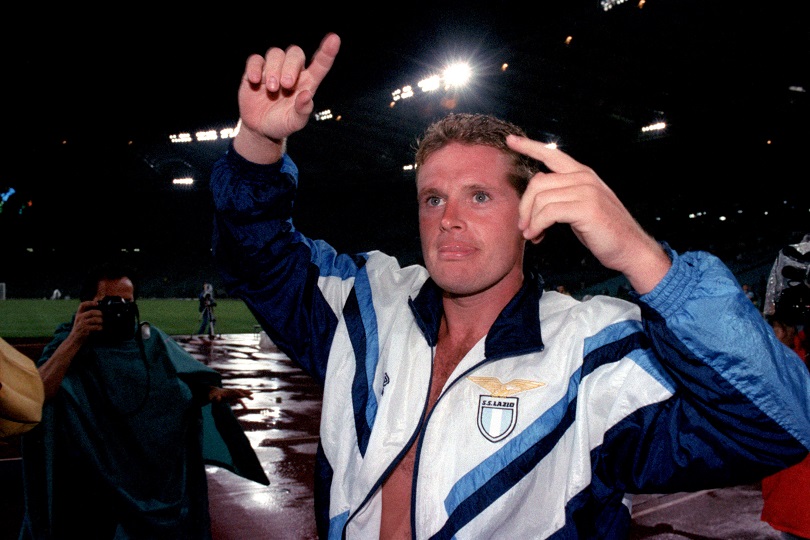
The idol of Ibrox Rangers: 1995-98
Utter the words ‘Paul Gascoigne’ and a broad smile will quickly appear on the face of any Rangers supporter
Gascoigne: “I don’t have any regrets about my time in Italy, but towards the end it was hard – me and the manager didn’t see eye-to-eye. I love my football, so going into work without a smile on my face wasn’t right.
"That’s why Rangers was perfect. I fell back in love with football and you can see by the way I played up there that I loved every minute. I had offers to move back to England, but Rangers felt like the right option. The game against Aberdeen underlined all that joy, and to get my hands on a league medal was the icing on the cake.”
Utter the words ‘Paul Gascoigne’ and a broad smile will quickly appear on the face of any Rangers supporter who gorged on the midfielder’s genius for a short but hugely successful period during the mid-’90s.
For two-and-a-half seasons between 1995 and 1998, Gazza dazzled the Ibrox faithful and he lit up the Scottish game with some outrageous performances.
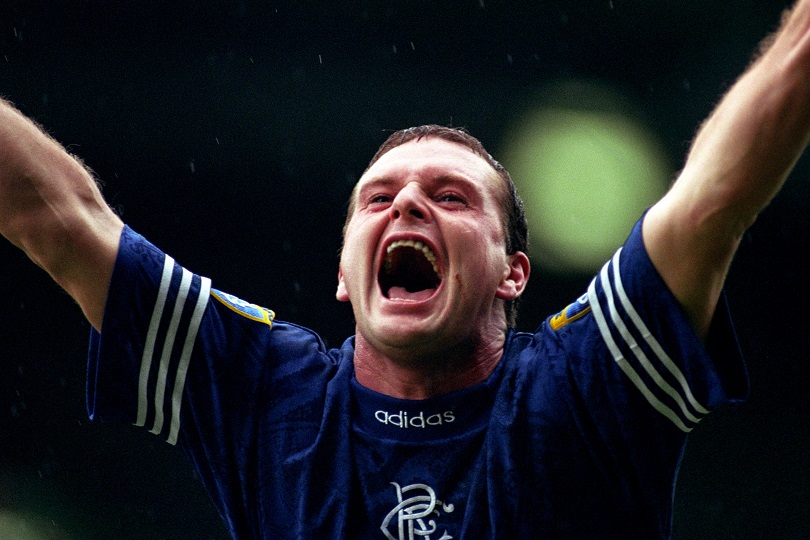
Of course, there were darker moments for this oft-tortured soul, but his sense of humour was embraced by his Rangers team-mates, many of whom were not averse to the odd practical joke themselves.
“I think we might just have got the best of his career,” says ex-striker Ally McCoist. “He was probably the one player I played with who could win a game on his own.
“He was also one of the funniest guys I have ever met. He turned up at training one day wearing waders and holding two trout! We were both injured at the time, and while the lads were away we decided to have some fun.
“We pinched Gordon Durie’s car keys and hid the fish under his spare wheel, but then Gazza took one back and hid it behind the backseat so that when ‘Jukebox’ eventually found the first one, he’d think that was it. But he couldn’t get rid of the smell! That was Gazza. He was bonkers.”
"Breathtaking ... unstoppable"
Rangers were trailing 1-0 and looking far from comfortable when a determined Gascoigne decided to take control
On the field, the England midfielder was peerless. He made an immediate impact by scoring a sensational winner on his Old Firm debut at Celtic Park just four games into his Rangers career, running from his own half to latch onto McCoist’s through-ball before passing it into the back of the net.
That was quite possibly the most spectacular of his 39 goals for the ’Gers, but the most important were undoubtedly the three that sealed an eighth successive Scottish title for Rangers when they hosted Aberdeen in April 1996.
Rangers were trailing 1-0 and looking far from comfortable when a determined Gascoigne decided to take control of the game.
First he collected the ball from a Brian Laudrup corner on the left side of the Aberdeen penalty area and jinked past two defenders before chipping the goalkeeper from the narrowest of angles for goal number one.
Next, he won possession 10 yards inside his own half, rampaged more than 60 yards towards the Aberdeen goal, holding off several challenges in the process, before finishing superbly to fire Rangers in front. The combination of flair, vision and almost brutish directness was pure, unadulterated Gascoigne.
Finally, he sealed his hat-trick and the league title with a penalty after Gordon Durie was barged over inside the box. It was a one-man show – the stuff dreams are made of – and it cemented his status as a hero in the blue side of Glasgow.
“It was one of the most breathtaking individual performances I’ve ever seen,” Rangers keeper Andy Goram tells FFT. “He was unstoppable that day.”
This feature originally appeared in the August 2015 issue of FourFourTwo. Subscribe!







